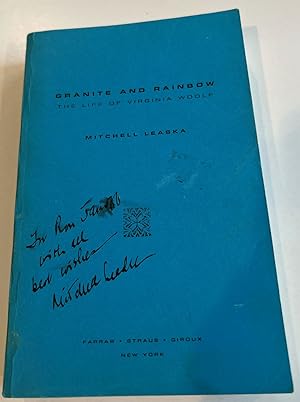Synopsis
Traces the life of the English novelist, including the harsh realities of her early life, her descent into madness, and her parents' troubled marriage
Reviews
"Oh but the divine joy of being mistress of my mind again!" Virginia Woolf once wrote. Apparently inheriting mental instability as well as intellectual brilliance, she employed words and recycled remembrance to exorcise her family ghosts. According to Leaska, an English professor at New York University and editor of Woolf's early journals, A Passionate Apprentice, which he exploits relentlessly here, Woolf's writing "twisted pleasure from pain" and created defenses against her manic-depressive cycles. Through Leaska's Freudian lens, Woolf?who blamed an elder half-brother's childhood molestations for her being "sexually cowardly"?was actually concealing oedipal fantasies about her domineering father, evoked in such novels as To the Lighthouse and The Years. Though the psychological sleuthing and the recounting of Bloomsbury homosexual and lesbian rapacity may be provocative, this work scants the actual texture of life?how people really lived?and intrusively insists on its unfortunate title (a 1958 title of a posthumous Woolf essay collection) by employing it metaphorically at least 11 times. Still, this book will stir more controversy than most of the seemingly endless run of Woolf biographies, the most recent of which was Hermione Lee's Virginia Woolf (Forecasts, March 24, 1997). In its shrewd probing for the wellsprings of the writer's creativity, Leaska's life can't be ignored. Illustrations not seen by PW.
Copyright 1998 Reed Business Information, Inc.
Another effort at what Woolf herself once described as the ``compromise, evasion, understatement, overstatement, irrelevance which we call biography.'' Woolf biographies and studies are still churned out at nearly an annual rate. Leaska, the editor of Woolf's early journals (A Passionate Apprentice) and her correspondence with Vita Sackville-West, as well as the author of several critical studies of her work, is a longtime mainstay of that academic industry. His appraisal of Woolf's life, here made largely through the lens of her writings, offers a thoroughgoing and yet curiously limited version of her portrait. Crucial aspects of her father, Leslie Stephen, the emotionally demanding patriarch of letters, and of her devoted but distant mother, Julia Duckworth Stephen, are viewed essentially through their fictional counterparts in To the Lighthouse. According to Leaska, the influence of her parents combined Leslie's dependency on others for approval and affection with Julia's defensive aloofness, leaving Woolf unbalanced as she embarked on her writing career and marriage. Perhaps Leaska took Woolf at her word when she wrote, ``Nothing is real unless I write it.'' He overdoes it with documentation, plumbing her voluminous diaries, as well as her novels, at the expense of taking a wider and more objective view of her relationships with the remarkable people in her life: husband Leonard, sister Vanessa, Clive Bell, Lytton Strachey, Roger Fry, Vita Sackville-West. Typically--and narrowly--these people are characterized as parental substitutes. Unsurprisingly, Vita emerges in a pivotal role as both a strong father-figure and an emotional mother-substitute (and as the inspiration for Orlando). Leaska seems overly concerned with Woolf's imaginative existence and not curious enough about her daily life. Earnest and faithful, but do we really need another after last year's superb Woolf biography by Hermione Lee? (photos, not seen) -- Copyright ©1998, Kirkus Associates, LP. All rights reserved.
Interest in Virginia Woolf seems to be limitless, as yet a fourth major biography in as many years now appears. Recent works have looked at Woolf's life from the standpoint of literary analysis (James King's Virginia Woolf, LJ 4/1/95), family life (Panthea Reid's Art and Affection: A Life of Virginia Woolf, LJ 9/15/96; Louise DeSalvo's Virginia Woolf: The Impact of Childhood Sexual Abuse on Her Life and Work, Ballantine, 1990), and the need to debunk misconceptions of her as a fragile, eccentric victim (Hermione Lee's Virginia Woolf: A Biography, LJ 5/1/97). Leaska (English, New York Univ.), who has written and edited a number of books about Woolf, argues that Woolf used her writing as a connection between the inner and outer worlds. Fiction was, to her, more satisfying than the real world in which she battled manic-depression and memories of a horrific family life. While the book is solidly written and well done, one has to wonder, in light of the plethora of recent biographies on Woolf, whether all the bases have already been covered. For comprehensive collections.?Ronald Ray Ratliff, Chapman H.S. Lib., Kan.
Copyright 1998 Reed Business Information, Inc.
Woolf authority Leaska wonders if Woolf's manic-depressive psychosis can account for her "extraordinary powers as a novelist and essayist." Can her "gift" be attributed to her illness? "Probably not," he answers, but her "manic periods may have accelerated her productivity . . . may have helped her see more intensely." Leaska examines that proposition in what must rank as one of the strongest, most penetrating investigations of an author's emotional and sexual life and its relation to the creative process. He breaks no new ground biographically; what he does offer is a careful, detailed dissection of Woolf's sexual relations, the effect of the abuse she suffered at the hands of her half-brother, her suicide attempts, and the conflicted relationships she had with her parents and her sister, Vanessa. Woolf "would always have trouble returning someone's love, but would never cease craving the love others gave her," Leaska concludes, providing readers with empathic insight into the woman and the writer. Ron Antonucci
"About this title" may belong to another edition of this title.
